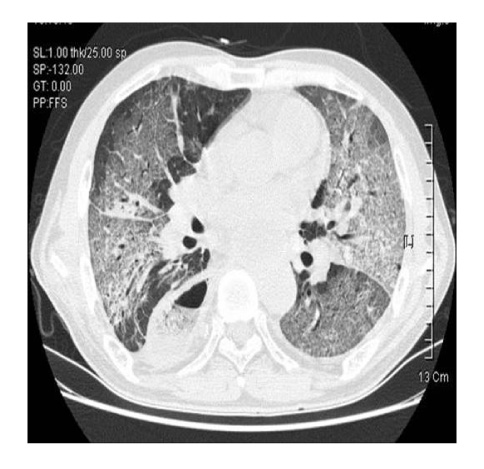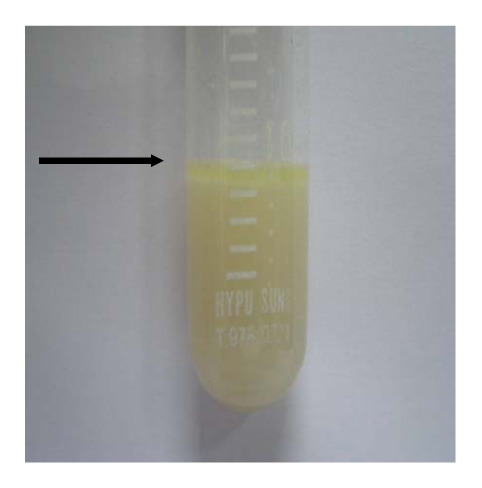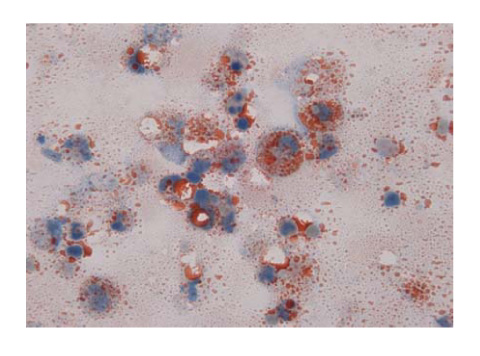Tuberc Respir Dis.
2006 Feb;60(2):235-238.
Severe Exogenous Lipoid Pneumonia Following Ingestion of Large Dose Squalene: Successful Treatment with Steroid
- Affiliations
-
- 1Division of Pulmonary and Critical Care Medicine, Department of Internal Medicine, Kangbuk Samsung Hospital, Sungkyunkwan University School of Medicine, Seoul, Korea. mdlimsy@skku.edu
- 2Department of Radiology, Kangbuk Samsung Hospital, Sungkyunkwan University School of Medicine, Seoul, Korea.
- 3Department of Pathology, Kangbuk Samsung Hospital, Sungkyunkwan University School of Medicine, Seoul, Korea.
Abstract
- Exogenous lipoid pneumonia (ELP) is an uncommon condition resulting from aspiration or inhalation of vegetable, animal or mineral oil. It results in foreign body type inflammatory reaction of the lung and can show various clinical presentations from asymptomatic incidental finding to severe pneumonia leading to acute respiratory failure. Although many cases have been reported, severe ELP requiring steroid or whole lung lavage for treatment is rare. We report a case of 51-year old man with esophageal cancer who developed severe ELP following ingestion of large dose shark oil (Squalene) and successfully treated with prednisolone.
Keyword
MeSH Terms
Figure
Reference
-
1. Spickard A 3rd, Hirschmann JV. Exogenous lipoid pneumonia. Arch Intern Med. 1994. 154:686–692.2. Nogue S, Sanz P, Borondo JC, Picon M, de la Red G, Mestre G. Fatal lipoid pneumonia due to bronco-aspiration of isoparaffin after ingestion of an organophosphate insecticide. Acta Anaesthesiol Scand. 2003. 47:777–779.3. Hyun JG, Rhee JH. Clinical investigation of lipoid pneumonia in adults. Tuberc Respir Dis. 1996. 43:965–975.4. Wright BA, Jeffrey PH. Lipoid pneumonia. Semin Respir Infect. 1990. 5:314–321.5. Gondouin A, Manzoni P, Ranfaing E, Brun J, Cadranel J, Sadoun D, et al. Exogenous lipid pneumonia: a retrospective multicentre study of 44 cases in France. Eur Respir J. 1996. 9:1463–1469.6. Jeong KJ, Kim YE, Lim GJ, Suh KD, Kim JD, Lee JH, et al. A Case of lipoid pneumonia after ingestion of green perilla oil. Tuberc Respir Dis. 1999. 47:123–126.7. Hussain IR, Edenborough FP, Wilson RS, Stableforth DE. Severe lipoid pneumonia following attempted suicide by mineral oil immersion. Thorax. 1996. 51:652–653.8. Chang HY, Chen CW, Chen CY, Hsuie TR, Chen CR, Lei WW, et al. Successful treatment of diffuse lipoid pneumonitis with whole lung lavage. Thorax. 1993. 48:947–948.9. Rossi SE, Erasmus JJ, Volpacchio M, Franquet T, Castiglioni T, McAdams HP. "Crazy-paving" pattern at thin-section CT of the lungs: radiologic-pathologic overview. Radiographics. 2003. 23:1509–1519.10. Laurent F, Philippe JC, Vergier B, Granger-Veron B, Darpeix B, Vergeret J, et al. Exogenous lipoid pneumonia: HRCT, MR, and pathologic findings. Eur Radiol. 1999. 9:1190–1196.11. Nicholson AG, Wells AU, Hooper J, Hansell DM, Kelleher A, Morgan C. Successful treatment of endogenous lipoid pneumonia due to Niemann-Pick Type B disease with whole-lung lavage. Am J Respir Crit Care Med. 2002. 165:128–131.12. Ayvazian LF, Steward DS, Merkel CG, Frederick WW. Diffuse lipoid pneumonitis successfully treated with prednisone. Am J Med. 1967. 43:930–934.13. Chin NK, Hui KP, Sinniah R, Chan TB. Idiopathic lipoid pneumonia in an adult treated with prednisolone. Chest. 1994. 105:956–957.14. Haro M, Murcia I, Nunez A, Julia E, Valer J. Massive haemoptysis complicating exogenous lipid pneumonia. Eur Respir J. 1998. 11:507–508.
- Full Text Links
- Actions
-
Cited
- CITED
-
- Close
- Share
- Similar articles
-
- Clinical study on lipoid pneumonia caused by aspiration of squalene
- A Case of Exogenous Lipoid Pneumonia after Ingestion of Squalene in Patients with Achalasia
- Lipoid Pneumonia After Aspiration of Squalene(R) in Rabbit
- Bilateral Pulmonary Infiltrate with Milky BAL Fluid
- A Case of Lipoid Pneumonia with Hypercalcemia Caused by Squalelne Intake by Force





